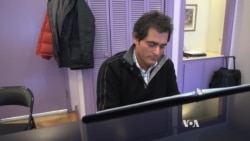A few days after Syrian-American pianist and composer Malek Jandali performed his song, "Watani Ana" ("I Am My Homeland"), outside the White House, Syrian security forces burst into his parents’ home in Homs and beat them.
“That was the first time ever realizing the ‘soft’ power of music,” Jandali said in New York, the week of his debut at Carnegie Hall’s Weill Recital Hall. He moved his parents to the U.S. soon after the incident in July 2011, but four years into the Syrian conflict, Jandali remains focused on using his music to raise awareness and, he hopes, help bring down the regime of Syrian President Bashar al-Assad.
“It is their music,” he said, referring to those resisting Assad. “I’m inspired by their courageous acts, by their memories, by their history. You have an 8,000-year-[old] culture here. And I am honored to have this opportunity to be their voice.”
Jandali describes his music, which has been performed by the Royal Philharmonic and other major orchestras, as “American neo-classical,” incorporating Middle Eastern melodies, rhythms and modes into new symphonies, sonatas, chamber works and other forms.
At Carnegie Hall, Jandali premiered new chamber works for piano, cello and oud, with cellist Laura Metcalf and oud player Abdulrahim Alsiadi.
He said that Syria's ancient culture inspired the works. “Each one is a story, a story of beautiful counterpoint, between the call of prayer from a minaret and the church bells in Damascus — or a child’s cry in Homs,” he said.
Classically trained at the Arab Institute of Music in Damascus, Jandali became interested in ancient Syrian music when he learned of Ugarit, an ancient city near where he had grown up in Homs.
“This is the city that invented the oldest form of musical notation. It dates back to 1400 B.C.,” Jandali said, holding a replica of a carved stone tablet about the size of an iPhone. “It has both words and music, and instructions on tuning the lyre. It is a song about a woman who couldn’t have a child, asking the moon god at the time to help her bear a child so her civilization could continue.”
The song became the basis for his first album, "Echoes from Ugarit."
Oud player Alsiadi said that Jandali was inventing a new musical language, and rescuing an old one: “He is saving the Syrian collective memory. With Malek, I would say this is the first time we see a composer taking the oud to the maximum limits. It’s very complex, and actually, we have now a different pronunciation on this instrument that we never had before.”
Jandali also released the CDs of his new Syrian Symphony at the concert, another gift to his people, he said, including the Syrian children growing up in refugee camps.
“You know, the question is why a Syrian symphony at this time, where people are in need of medicine, food, shelter,” he said. “And I’m envisioning someone a hundred years from today, looking back, saying, 'What did the Syrian people do during their revolution? Ah, here’s a Syrian symphony!' Similar to what Shostakovich did, for example, in his Leningrad Symphony. So what I’m trying to do is preserve and present my culture that is being destroyed today.”












